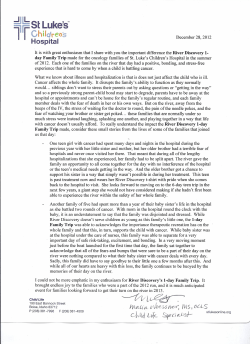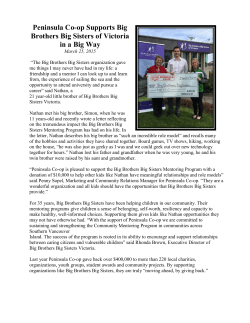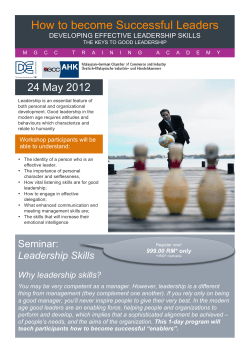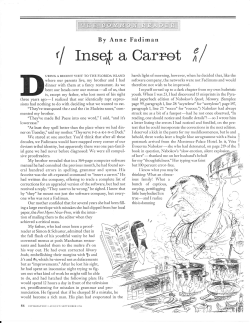
Document 60311
TRANSCRIPT EPISODE 21: TALKING ABOUT THE FAMILY Hello, and welcome to Study English, IELTS Preparation. I'm Margot Politis. The family is a common topic in IELTS, especially in Part 1 of the Speaking Test. Talking about such a familiar topic might seem simple, but doing it well requires thought and practice. Let's listen to someone talking about their family: My mother is a teacher and my father is an architect. I've got 2 brothers and one sister, so that's all the immediate family. She begins by identifying her mother and father, and then her brothers and sister. What did she call all of them together? My mother is a teacher and my father is an architect. I've got 2 brothers and one sister, so that's all the immediate family. The immediate family. Another term for this is nuclear family. That's the parents – mother and father – and the siblings – brothers and sisters. A male child is called the son of his parents and a female child is called the daughter. Mother and father are the formal words. In informal English you say mum and dad, like this: Me and my mum we immigrated to Australia in 1991 to Perth and then I moved over to Sydney to be with my dad, then dad moved back to Thailand, so yeah. The family outside of the immediate family is called the extended family. The parents of your parents are called grandparents – grandmother and grandfather. The brothers and sisters of your parents are called uncles and aunts. Listen: Both my parents were only children, so I don't have any aunts or uncles. But I do have a niece, my oldest brother's daughter. If you refer to your mother's sister, you can say "my aunt on my mother's side". If you refer to your father's father, you can say "grandfather on my father's side". The children of your aunts and uncles are called "cousins", whether male or female. The children of your brothers and sisters are called nephews if they're boys and nieces if they're girls. Page 1 of 4 What did our first speaker say about her extended family? Both my parents were only children, so I don't have any aunts or uncles. But I do have a niece, my oldest brother's daughter. She said her both her parents were only children. This means they were the only child of their parents and didn't have any brothers or sisters. If there are several children in your family you talk about them by order of birth, like this: I have one older brother, he's 22. I have, I'm in the middle and I'm 20 and I have a younger sister who is 15. The first child in the family can be called the oldest and the last the youngest. Sometimes the youngest is called the baby brother or sister, or as in the next clip, the little brother or sister: I've got 2 sisters and a little brother. The children of a family are a generation and the children they go on to have are the next generation. For instance, when someone's parents immigrate to Australia and have children here, those children are called first-generation Australians. When they grow up and have children, their children are referred to as second-generation Australians. Listen: My parents were born in Italy but my brothers and sister were born here so we're first generation Australians. My niece is second generation. A married couple are husband and wife. Each is called the spouse of the other. The words for relatives by marriage are the same as with your immediate family, but with –in-law added. So your spouse's father is your father-in-law and their sister is your sister-in-law. The plural of these forms is sisters-in-law and fathers-in-law. Death and divorce mean that people remarry and have children with a different parent. This parent by marriage is called your step-mother or step-father. Any children they may already have become your step-brothers and step-sisters. The children they go on to have with your actual mother or father are your half-brothers or halfsisters. In the IELTS Speaking Test it is important to extend your answers. When asked about your family, it's best to reply first by saying who is in your immediate family as our first speaker did: Page 2 of 4 My mother is a teacher and my father is an architect. I've got 2 brothers and one sister, so that's all the immediate family. Now listen to how you might develop a longer answer, like this: My mum was born in Malaysia in a town called Bentong, which is just north of Kuala Lumpur. But her family origin is Sri Lankan Tamil. So racially I guess you'd say they're South Indian. But they migrated to Sri Lanka and then her family …her elder sister was born in Sri Lanka. But then her family moved to Malaysia and most of the other children were born in Malaysia. First she says where her mum was born: My mum was born in Malaysia in a town called Bentong, which is just north of Kuala Lumpur. But her mother isn't ethnically Malaysian, so she points this out: But her family origin is Sri Lankan Tamil. So racially I guess you'd say they're South Indian. She then explains how her mother came to be born in Malaysia: Her elder sister was born in Sri Lanka. But then her family moved to Malaysia and most of the other children were born in Malaysia. When developing your answer, be careful to use the correct prepositions – in or at. You are born 'in' a country and 'in' a town. Listen: My mum was born in Malaysia in a town called Bentong, which is just north of Kuala Lumpur. If you decided to say where your parents were educated, you need to say 'at' – "my father studied at University." There are many possible questions that can be asked about families. The questions are designed to make you use particular language functions. So, for making comparisons you may be asked: "Are nuclear families better than extended families?" And for giving an opinion, the examiner might ask: "Should children always obey their parents?" If the examiner asked you: "What is the best age to get married?" They are expecting you to identify and explain. So it's a good idea to think about possible questions like these and try to make up some more questions yourself. Listen to the way this woman responds to the question: "What's a normal family?" Page 3 of 4 I don't think there's any such thing as a normal family, but, yeah my family gets along well. It's got it's quirks but we get along well. That's challenging the question, which you are allowed to do as long as you justify what you say. When answering questions about family, you need to be able to identify family members and their relationships to one another with the correct words. What family members does this woman mention? I used to speak Cantonese at home when I was a kid and then when I went to school I spoke English with all my friends, and a few of my cousins are here and things, so I spoke English with them as well, and then slowly I lost learning Cantonese and I can't speak it anymore. She talked about her cousins, who are the children of her aunts or uncles. You need to have something to say about your family, so be prepared to say where your parents were born or where your brothers or sisters work or study, like this: My oldest brother studied law at Flinders University in Adelaide and got a job at a law firm in the city where he met his wife. They were married 2 years ago and last year they had their first child. My sister-in law is expecting another baby. I'm hoping for a nephew this time. She talked about her oldest brother, his wife who is also her sister-in-law and her potential nephew. She said when her brother was married, where he studied and what he does and even where he met his wife. That's all for now. To find more information about the speaking test and to view other episodes, visit our Study English website. (The address is: australianetwork.com/studyenglish) Good Luck with your studies. Page 4 of 4
© Copyright 2025





















